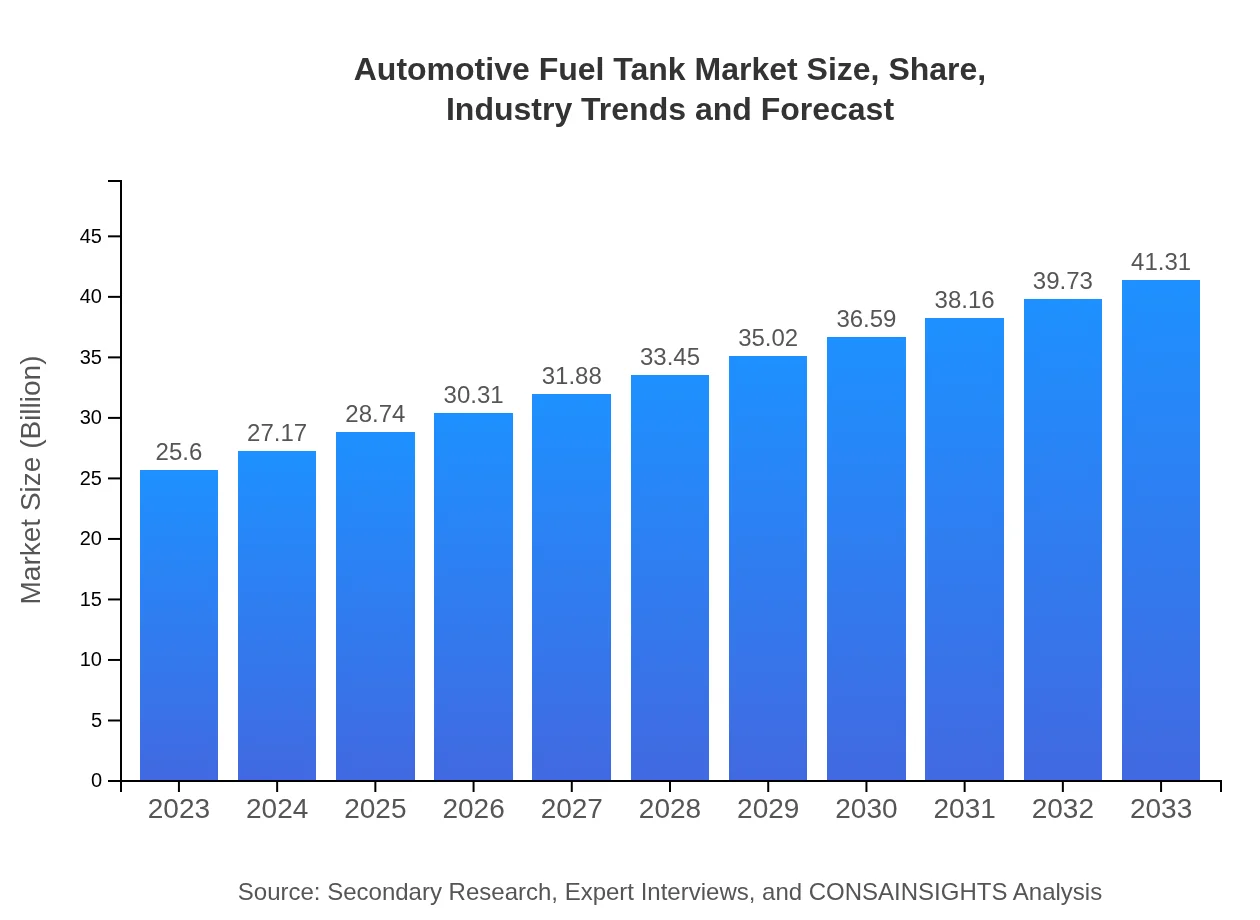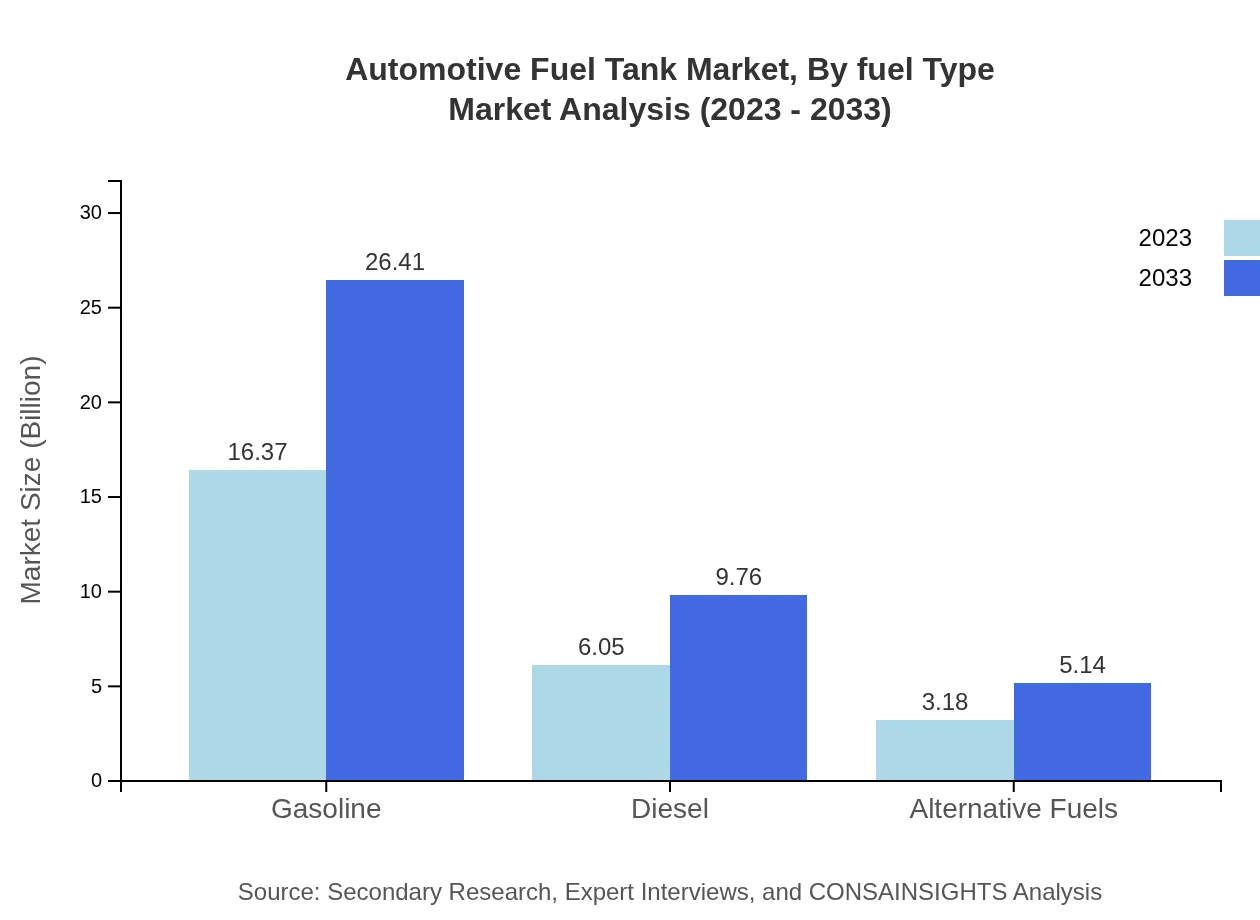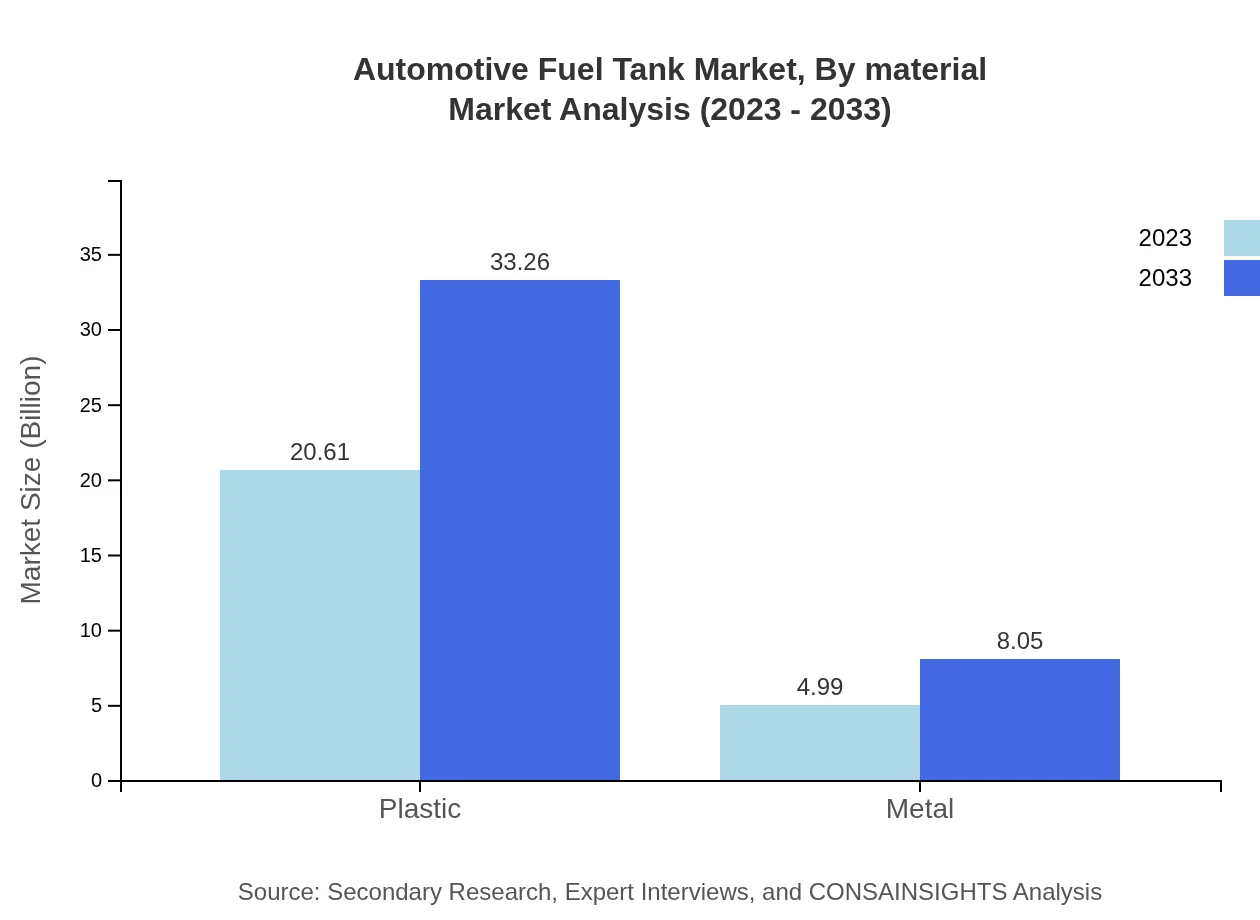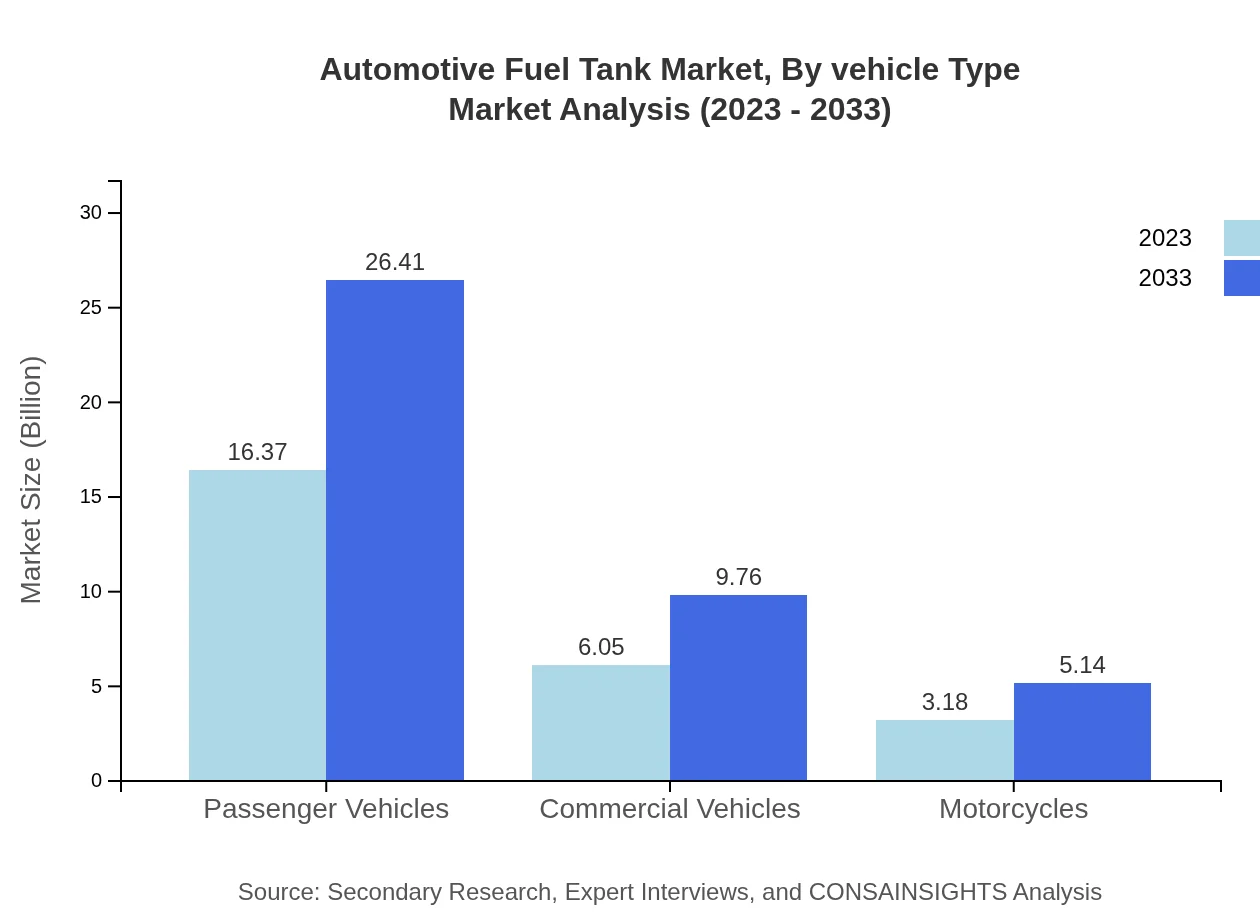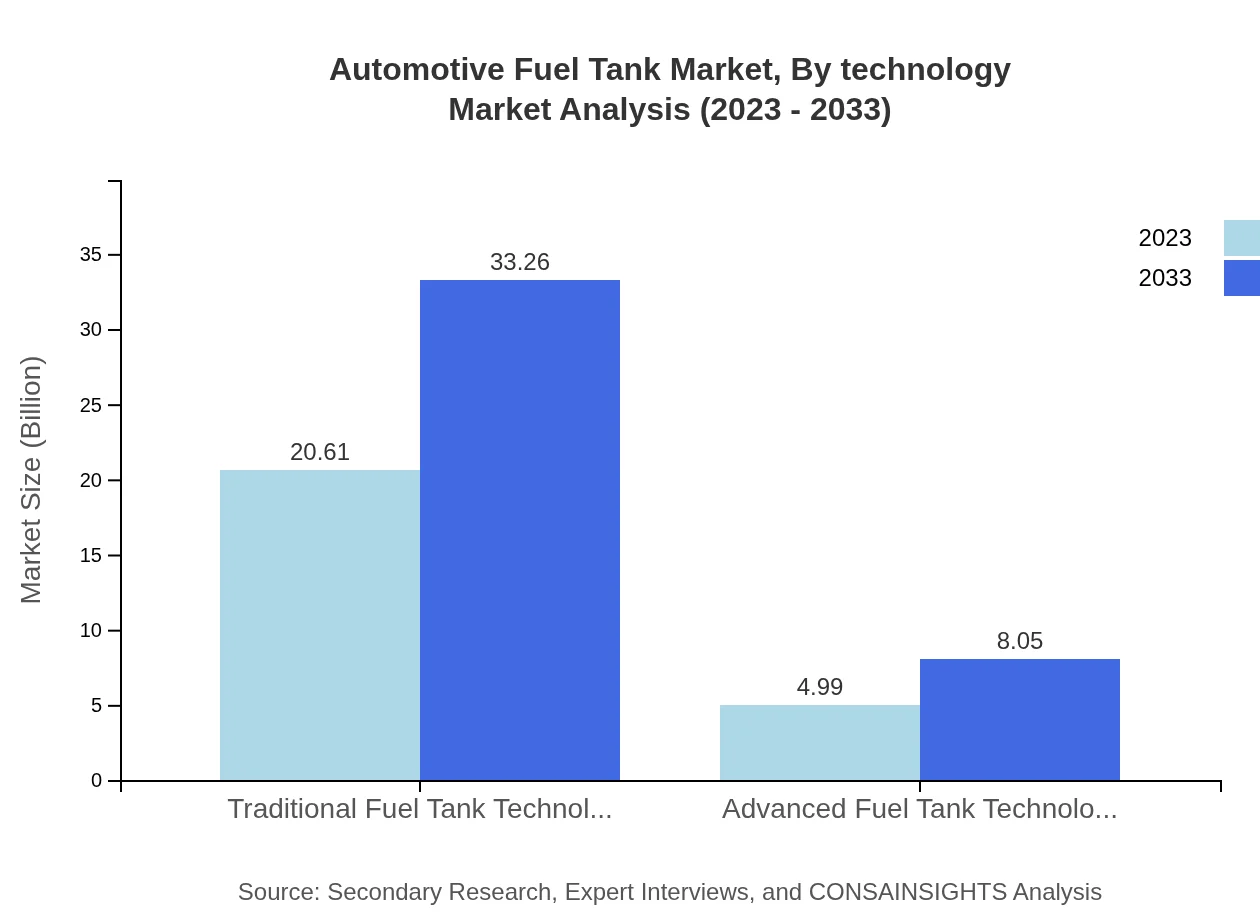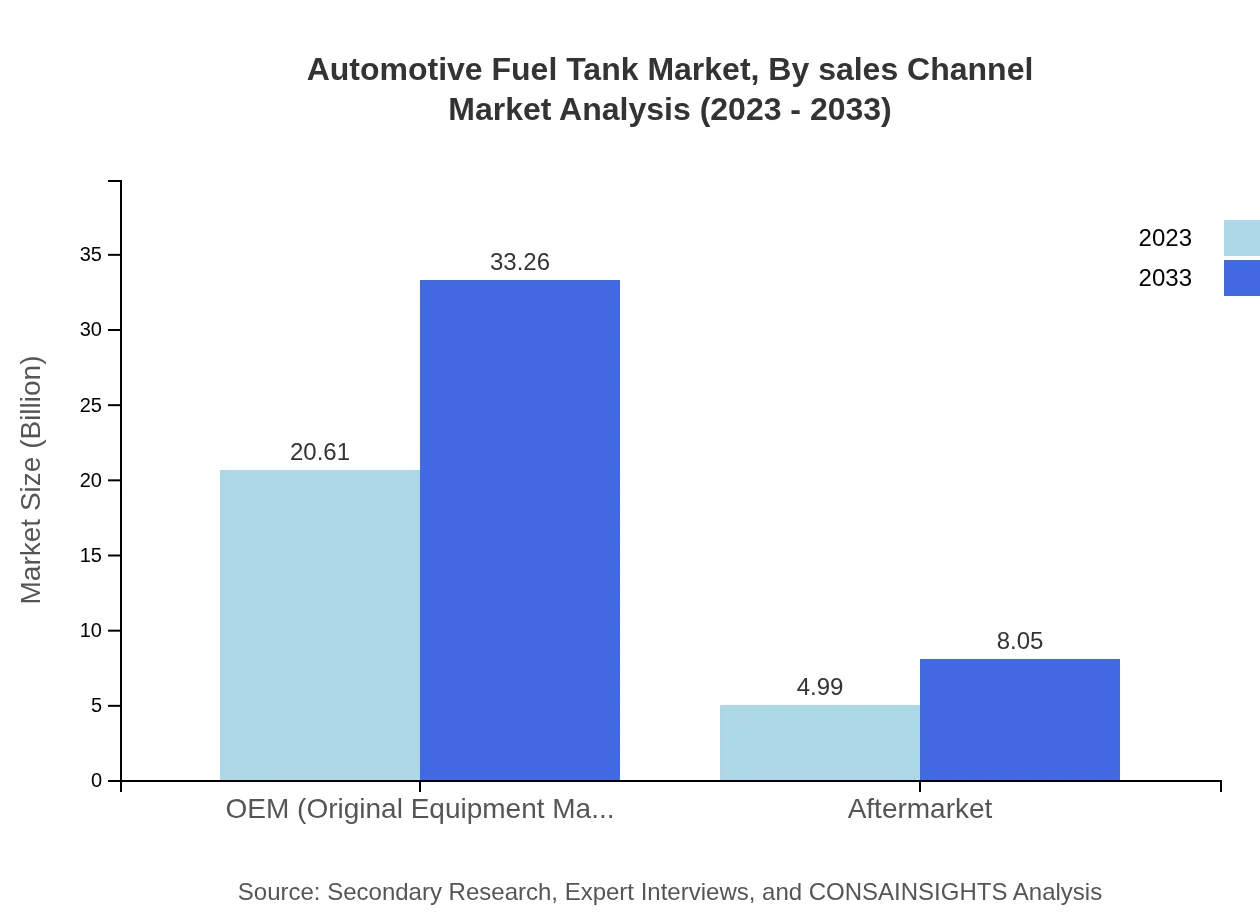Automotive Fuel Tank Market Report
Published Date: 02 February 2026 | Report Code: automotive-fuel-tank
Automotive Fuel Tank Market Size, Share, Industry Trends and Forecast to 2033
This report provides an in-depth analysis of the Automotive Fuel Tank market, focusing on current trends, growth drivers, market size, segmentation, and insights from 2023 to 2033, facilitating a comprehensive understanding of market dynamics and future projections.
| Metric | Value |
|---|---|
| Study Period | 2023 - 2033 |
| 2023 Market Size | $25.60 Billion |
| CAGR (2023-2033) | 4.8% |
| 2033 Market Size | $41.31 Billion |
| Top Companies | Continental AG, TI Automotive, Magna International, DENSO Corporation |
| Last Modified Date | 02 February 2026 |
Automotive Fuel Tank Market Overview
Customize Automotive Fuel Tank Market Report market research report
- ✔ Get in-depth analysis of Automotive Fuel Tank market size, growth, and forecasts.
- ✔ Understand Automotive Fuel Tank's regional dynamics and industry-specific trends.
- ✔ Identify potential applications, end-user demand, and growth segments in Automotive Fuel Tank
What is the Market Size & CAGR of Automotive Fuel Tank market in 2023?
Automotive Fuel Tank Industry Analysis
Automotive Fuel Tank Market Segmentation and Scope
Tell us your focus area and get a customized research report.
Automotive Fuel Tank Market Analysis Report by Region
Europe Automotive Fuel Tank Market Report:
The European Automotive Fuel Tank market is forecast to grow from $8.49 billion in 2023 to $13.70 billion by 2033. Government regulations aimed at reducing carbon footprints, along with a growing electric vehicle segment, are enhancing the market dynamics significantly.Asia Pacific Automotive Fuel Tank Market Report:
In the Asia Pacific region, the Automotive Fuel Tank market reached $4.53 billion in 2023 and is projected to grow to $7.30 billion by 2033. Factors such as increasing vehicle production, a substantial youth population, and rapid urbanization are key drivers for this growth. Furthermore, the region's shift towards manufacturing advanced fuel-efficient vehicles is influencing fuel tank technology adaptations.North America Automotive Fuel Tank Market Report:
North America exhibited a market size of $8.91 billion in 2023, with expectations to reach $14.38 billion by 2033. The rise in electric vehicle sales and stringent emission regulations are pivotal in driving market advancements. Leading automakers are increasingly investing in innovative fuel storage solutions.South America Automotive Fuel Tank Market Report:
The South American market for Automotive Fuel Tanks is expected to expand from $0.78 billion in 2023 to $1.26 billion by 2033. Economic improvements and rising consumer spending power lead to increased vehicle ownership, directly impacting fuel tank demand.Middle East & Africa Automotive Fuel Tank Market Report:
The market in the Middle East and Africa is anticipated to grow from $2.89 billion in 2023 to $4.67 billion by 2033. This growth can be attributed to the expansion of the automotive industry in developing nations, highlighting the region's increasing role as a regional manufacturing hub.Tell us your focus area and get a customized research report.
Automotive Fuel Tank Market Analysis By Fuel Type
The fuel type segment illustrates strong performance across gasoline, diesel, and alternative fuels. In 2023, gasoline fuel tanks dominate the market with a size of $16.37 billion and is expected to reach $26.41 billion by 2033, holding a market share of 63.93%. Diesel fuel tanks, presently at $6.05 billion, are projected to grow to $9.76 billion, capturing 23.63% market share. Meanwhile, alternative fuels, with an initial market size of $3.18 billion in 2023, are expected to achieve $5.14 billion, making up 12.44% of the market.
Automotive Fuel Tank Market Analysis By Material
Plastic fuel tanks significantly dominate the market, with a size of $20.61 billion in 2023, expected to surge to $33.26 billion by 2033, maintaining a market share of 80.52%. Conversely, metal fuel tanks will grow from $4.99 billion to $8.05 billion over the same period, reflecting a steady share of 19.48%.
Automotive Fuel Tank Market Analysis By Vehicle Type
In the vehicle-type segment, passenger vehicles lead with a market size of $16.37 billion, expected to grow to $26.41 billion by 2033, maintaining a share of 63.93%. Commercial vehicles are projected to grow from $6.05 billion to $9.76 billion, holding a 23.63% share. Motorcycles, currently at $3.18 billion, are expected to reach $5.14 billion, representing 12.44% of the market.
Automotive Fuel Tank Market Analysis By Technology
Traditional fuel tank technology currently holds a market size of $20.61 billion in 2023 and is expected to expand to $33.26 billion by 2033, capturing an enduring 80.52% share. Meanwhile, advanced fuel tank technology is projected to grow from $4.99 billion to $8.05 billion, retaining a market share of 19.48%.
Automotive Fuel Tank Market Analysis By Sales Channel
The OEM segment significantly dominates with a market size of $20.61 billion and will reach $33.26 billion by 2033. The aftermarket segment holds a market size of $4.99 billion in 2023, anticipated to grow to $8.05 billion, showcasing a consistent share of 19.48%.
Automotive Fuel Tank Market Trends and Future Forecast
Tell us your focus area and get a customized research report.
Global Market Leaders and Top Companies in Automotive Fuel Tank Industry
Continental AG:
A leading automotive parts manufacturer known for its innovation in fuel tank systems, offering solutions that enhance vehicle safety and performance.TI Automotive:
Specializes in automotive fluid storage and delivery systems, delivering cutting-edge fuel tank products designed for lightweight applications.Magna International:
A global automotive supplier with advanced technological capabilities in fuel tank systems, focusing on sustainable practices and integrated fuel solutions.DENSO Corporation:
A top-tier global supplier of advanced automotive technology, products, and systems with a strong positioning in the fuel tank segment.We're grateful to work with incredible clients.









FAQs
What is the market size of automotive Fuel Tank?
The global automotive fuel tank market is projected to reach approximately $25.6 billion by 2033, growing at a CAGR of 4.8% from 2023. This underscores a significant demand increase stemming from evolving automotive technologies and fuel requirements.
What are the key market players or companies in this automotive Fuel Tank industry?
Key market players in the automotive fuel tank industry include established manufacturers and suppliers specializing in fuel tank production such as TI Automotive, Kautex Textron, and Yachiyo Industry Co., Ltd. These companies lead through innovation and technology adoption.
What are the primary factors driving the growth in the automotive Fuel Tank industry?
Growth in the automotive fuel tank industry is driven by the increasing production of vehicles, regulatory standards for fuel efficiency, and advancements in fuel tank technologies, including lightweight materials and alternative fuel compatibility.
Which region is the fastest Growing in the automotive Fuel Tank?
Asia Pacific is the fastest-growing region in the automotive fuel tank market, with its market size expected to grow from $4.53 billion in 2023 to $7.30 billion by 2033, showcasing a robust expansion driven by high vehicle production rates.
Does ConsaInsights provide customized market report data for the automotive Fuel Tank industry?
Yes, ConsaInsights offers customized market report data tailored to specific needs within the automotive fuel tank industry, enabling clients to gain insights into niche segments, competitive landscapes, and regional market dynamics.
What deliverables can I expect from this automotive Fuel Tank market research project?
From this market research project, you can expect detailed reports encompassing market size, segmentation data, competitive analysis, growth forecasts, and regional insights to inform strategic decision-making in the automotive fuel tank space.
What are the market trends of automotive Fuel Tank?
Key trends in the automotive fuel tank market include increased adoption of plastic tanks for weight reduction, the rise of advanced fuel tank technologies, and a growing shift towards alternative fuels, emphasizing sustainability in the automotive sector.

